What is Alopecia Areata?
Alopecia Areata (or spot baldness) is a form of inflammatory hair loss. Although it has been known for a long time, it has remained largely unexplored, even though more than 1.5 million people of the German population are affected by this disease in its various forms.
Typical symptoms for Alopecia Areata are circular patches of baldness where hair falls out, which is why this disease is also called “spot baldness”. In 80% of all cases hair loss occurs in the head area, but may also occur in the beard area and in exceptional cases other areas of body hair growth are affected. These bald surfaces often do not contain any hair at all and the patches tend to spread further from the center. For most patients, only a few bald spots develop, and these sometimes disappear spontaneously as hair starts growing again without treatment.
In the case of Alopecia Totalis, a person loses all hair on his head, and in the case of Alopecia Universalis, all areas of body hair growth are affected. These forms of the disease are (fortunately) rare.
Types of alopecia:

Alopecia Ophiasis
Hair is missing behind the ears and on the neck. Eyebrows and other body hair are still present.

Alopecia Areata
Hair falls out in a few places on a patient’s head. Eyelashes, eyebrows and other body hair are usually not affected.

Alopecia Totalis
Patients’ head hair falls out completely, including eyebrows and eyelashes. The remaining body hair is partly present.

Alopecia Universalis
Head hair falls out completely, including eyebrows, eyelashes and nose hair. Besides, all body hair is missing.
A somewhat more common form of Alopecia is Alopecia Ophiasis in its chronic form. In this case, hair is missing on the temples, over the ears to the neck; sometimes a horseshoe-shaped fringe of hair (several centimeters long) remains around the bald spot, as the disease progresses over a longer period of time. Single bald patches merge into bigger ones or, in case of hair regrowth, become somehow blurred, as the hair loss progresses further. Research suggests that phases of hair loss and regrowth can alternate and repeat over and over again.
Complete hair loss can happen quickly and within a few weeks, one can become totally bald. Alopecia Areata can affect both women and men of all ages, but most frequently it affects young people for the first time. Alopecia Areata is not a rare diagnosis in children. In Germany alone, about 1.5 million people are affected in their childhood.
 Alopecia Areata Germany e. V.
Alopecia Areata Germany e. V. 


